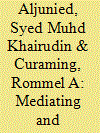| Srl | Item |
| 1 |
ID:
117072


|
|
|
|
|
| Publication |
2012.
|
| Summary/Abstract |
What makes a 'classic' in South East Asian studies? In addressing this question, the paper compares and contrasts the features of two books written in the late 1940s and early 1950s: Teodoro Agoncillo's The Revolt of the Masses and George Kahin's Nationalism and Revolution in Indonesia. It examines the subject position of the authors and the politico-academic contexts in which their works were written, assessed and consumed. Specifically, the paper explores the following questions. To what extent did scholarly merit define a 'classic'? What features internal to particular area studies stimulated or impeded the making of a potential classic? What sort of political and academic architectures were conducive or unreceptive to potential candidates? In what ways, and to what extent, have the 'rules of the game' changed 60 years later?
|
|
|
|
|
|
|
|
|
|
|
|
|
|
|
|
| 2 |
ID:
112947


|
|
|
|
|
| Publication |
2012.
|
| Summary/Abstract |
Considered by many as the founding moment of Muslim separatism in Mindanao, the Jabidah massacre, which took place on Corregidor Island, involved the killing of Muslim trainees who were being prepared by the Philippine military in 1967 and 1968 to infiltrate and sabotage neighboring Sabah. This article analyzes the ways by which memories of this iconic event have in the past four decades been recorded, remembered, mythicized, appropriated, or simply consumed for their own purposes by political elites, civil society actors, and ordinary people in the Philippines. Our angle of vision is directed toward what we term "contentious vectors" -news media, novels, films, and blogs-to analyze the processes by which memories are recast. The ways by which the Jabidah massacre is remembered and appropriated reflect the contestations between civil society and the government in the Philippines, as well as the intense rivalry among the political elites both within and between the Christian-elite-dominated Filipino polity and Muslim communities. The struggle to influence the shape of memories of Jabidah is part and parcel of an ongoing struggle to create competing nations-of-intent amidst the persistent tensions between the state and its dissenters.
|
|
|
|
|
|
|
|
|
|
|
|
|
|
|
|